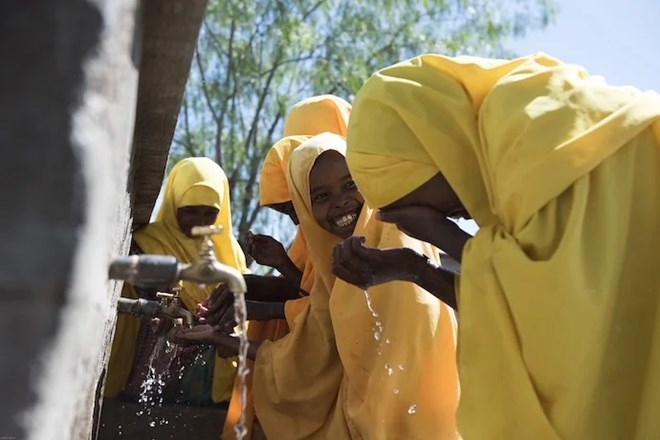
Tuesday December 10, 2024

Somali schoolgirls in Mogadishu. (Michael Tsegaye/UNICEF Ethiopia)
Since the collapse of Somalia’s central government in 1991, the international community has grappled with how to address the nation’s relentless crises. Civil war, recurrent droughts, foreign invasions, the rise of religious extremism, entrenched criminal networks, waves of refugees, and pervasive poverty have converged to make Somalia a case study in protracted state failure.
Over the decades, external actors have attempted to organize reconciliation meetings, often held outside the country, while seeking guidance from traditional allies whose interests in Somalia were not entirely altruistic. Strikingly, these efforts have largely excluded Somalia’s own policy analysts, technocrats, and administrators—many of whom were instrumental in building one of Africa’s fastest-growing economies during the 1970s and 1980s.
This neglect has been costly. Instead of drawing on the expertise of administrators, educators, and security professionals who once demonstrated the capacity to foster a democratic and economically vibrant state, Somalia was handed over to ill-trained, poorly educated, and ethnocentric political figures. These individuals have not only squandered the country’s potential but also undermined international efforts aimed at recovery, wasting decades of time, energy, and resources.
It is not unusual for nations emerging from civil war to face extended periods of instability, but Somalia’s plight is uniquely aggravated by a flawed reconstruction process. Internationally supported frameworks have inadvertently deepened divisions, perpetuating suffering and further dismantling the social and political fabric. Somalia has reached a crossroads where an alternative approach is not only desirable but urgently necessary to reverse its trajectory toward becoming yet another nation lost to history.
History offers sobering lessons about the impermanence of nations. From the Mongol Empire and the Songhai-Mali Kingdom to Yugoslavia and the Soviet Union, once-thriving states have disappeared from the global map, their legacies relegated to history books. Somalia risks joining this list unless it fundamentally rethinks its path forward. The intractable challenges of the modern era—climate change, population growth, food insecurity, resource conflicts, and an escalating refugee crisis—are likely to intensify, further testing Somalia’s capacity to withstand such shocks. Under its current divisive and ethnocentric governance structure, the nation appears ill-equipped to navigate the mounting pressures of an unstable world.
A new model of governance must replace the current, ineffectual framework. Central to this vision is the establishment of a Governing Council—a transitional authority tasked with rebuilding the foundations of the state. This council would be composed of no more than 25 members, drawn from Somalia’s five primary clans, ensuring broad representation while maintaining manageable decision-making processes. Council members would be selected based on their demonstrated integrity, competence, and capacity for leadership, embodying the qualities necessary to inspire confidence and guide the nation toward stability and growth.
The Governing Council would elect a chairman and deputy chairman from among its members and assume the responsibilities of the government for a transitional period of three years. During this time, the council would dissolve the current parliament, along with the offices of the president, prime minister, and all ministers, whose collective failures have rendered them obstacles to progress. The council’s mandate would include completing Somalia’s Provisional Constitution, strengthening the rule of law, and ensuring its approval by a majority of citizens. It would also prioritize the creation of a centralized military, police force, and intelligence services capable of maintaining national security and combating internal threats.
Beyond restoring basic governance, the council would lay the groundwork for a democratic electoral system, establishing an independent electoral commission to oversee free and fair elections. Economic revitalization would be another key priority, with efforts focused on fostering a sustainable and self-reliant economy. The council would also work toward removing Somalia from Chapter Seven of the United Nations Charter, which currently subjects the nation to international oversight due to its instability.
This transitional authority would continue to receive financial support from the international community, as is currently the case. However, the goal would be for Somalia to achieve fiscal independence within three years, leveraging internally generated resources to sustain its governance and development.
Over decades of dysfunction, Somalia’s existing framework has exposed its flaws. What is required now is a bold departure from the status quo—a governance model rooted in competence, accountability, and a clear vision for national renewal. The proposed Governing Council offers a pragmatic solution, one that draws from Somalia’s own traditions of consensus-building while addressing the structural failures that have perpetuated its crises.
Without decisive action, Somalia risks not only its sovereignty but its very existence. The cascading shocks of the 21st century will not wait for the nation to find its footing. A new approach is imperative—one that prioritizes the expertise of capable leaders, the inclusion of diverse voices, and the pursuit of genuine, transformative reform. Only then can Somalia hope to reclaim its place as a thriving, self-sustaining nation in an increasingly uncertain world.
This piece was first published in the International Policy Digest
Sheiknor Qassim is a Somali political activist and a prominent figure in the South West political landscape.